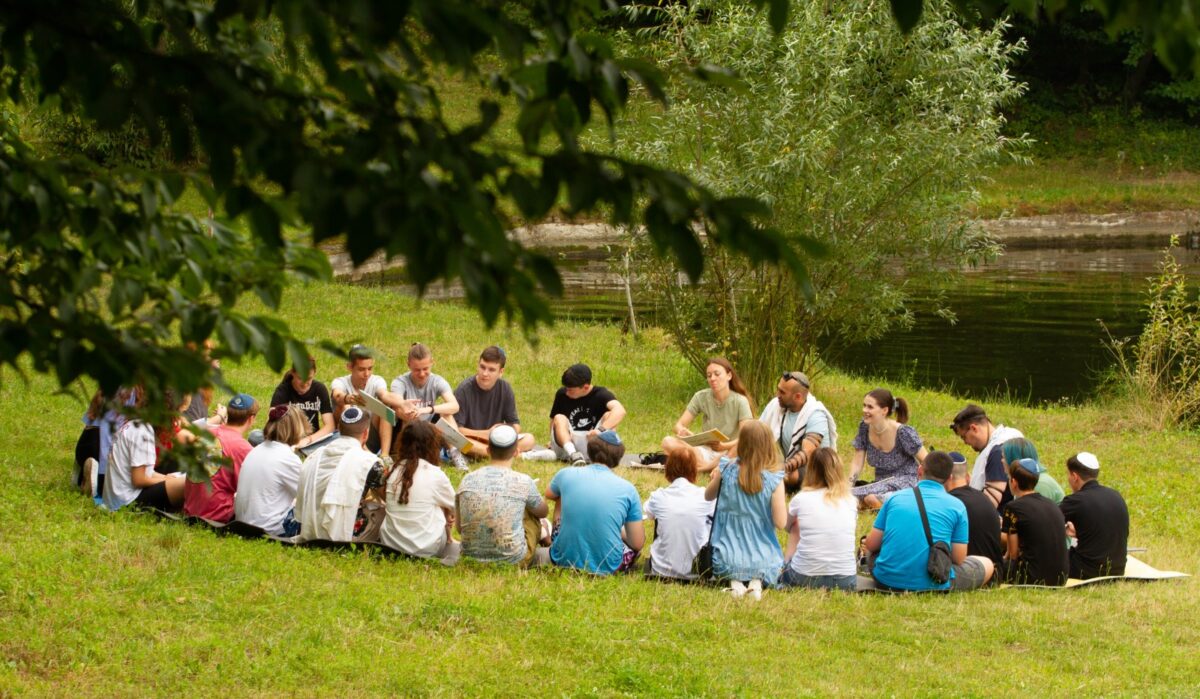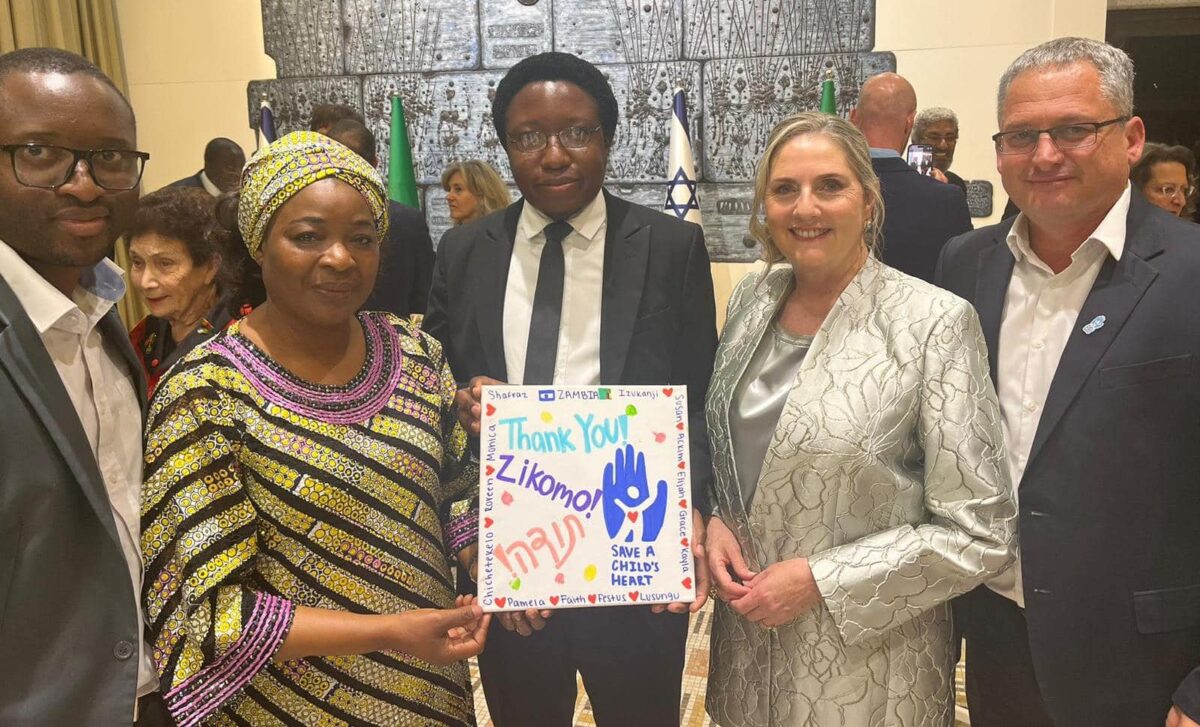Your Daily Phil: Ramah returns to war-torn Ukraine + Mazon absorbs Challah for Hunger né Nazun
Good Monday morning!
In today’s edition of Your Daily Phil, we report on the return of Camp Ramah Yachad to Ukraine, and feature an opinion piece on failure from Rabbi Joshua Rabin. Also in this newsletter: Cardi B, Heather Klein and Jamie Foxx. We’ll start with Mazon absorbing the campus hunger-focused group Nazun.
Mazon: A Jewish Response to Hunger has absorbed the campus-focused hunger organization Nazun, which will revert back to its former name: Challah for Hunger. Nazun approached Mazon about the merger in March, and — after being shared with stakeholders from both organizations in late July — the arrangement officially went into effect on Aug. 4, reports eJewishPhilanthropy’s Esther Kustanowitz.
Nazun, which uses leadership development, advocacy, community and philanthropy to work toward ending hunger and other social challenges on college campuses, felt its independence was unsustainable, but didn’t want to see its work end, Abby Leibman, Mazon’s CEO, told eJP.
“We have enormous respect for this program, and we’ve been so impressed by it,” Leibman said. “It’s very energizing to have an opportunity to build on something great, and shepherd it through growth, and really stretch its wings.”
Challah for Hunger was founded by Scripps College student Eli Winkelman in 2004. Winkelman served as CEO — Challah enthusiasm officer, naturally — for nine years and then transitioned to the board (which she wrote about for eJP at the time).
Nazun — which changed its name in January 2022 — will cease to exist as a separate organization, but Leibman said that Nazun’s campus chapters have been notified and reassured that they’ll be using the same platforms to implement the same programs. Over time, it may evolve, but only gradually, Mazon’s leadership assured.
Read the full story here.
Camp comforts


Camp Ramah Yachad returned to Ukraine this summer, with over 120 children attending the 11-day session, after being forced to relocate to neighboring Romania last year because of the war, reports eJewishPhilanthropy’s Judah Ari Gross.
A Jewish cocoon: Despite being held inside Ukraine, which is still regularly bombarded by Russian rocket, drone and artillery strikes, the camp — located in Sonyachna Dolyna, literally Sunny Valley, outside Chernivtsi in western Ukraine (not to be confused with a place of the same name in Crimea) — offered the participants a respite from the fighting, which all of them have experienced firsthand to some degree. “They were living in a cocoon, in a paradise. They were smiling, they were dancing and everything was Jewish,” said Rabbi Leonid Feldman, who was born in the former Soviet Union and served for decades as a pulpit rabbi in West Palm Beach, Fla., before moving to Israel last year.
First aid: While the campers were all in high spirits, David Kekst, vice chair of Schechter Institutes’ board of directors, said the difficult experiences that they had been through and the effects of the war on them were immediately apparent. A psychologist was on staff to help the campers. The content of the camp also reflected the fact that the program was being held in a country in the middle of a major conflict. “One of the doctors holds a chug [elective class] on first aid. She told the kids that if someone loses a limb, they must tie a tourniquet and note the time that they did so so they can tell an adult or a medic who subsequently arrives,” Kekst said. “I don’t think this is being taught at most Jewish summer camps but obviously this is something these kids need to know.”
We see you: Kekst said the camp organized a question-and-answer session over Shabbat, where the campers could ask the visitors whatever they wanted. “They said, ‘Why did you come to see us?’” Kekst said. “And I got up and I said, ‘Look, I helped organize this trip. And the reason is that the Jewish people stand as one, and we wanted you to know that we see you, that we hear you, and that we care enough to come and visit you to show solidarity with you.’”
Read the full story here.
Try, try again
Why everyone needs a résumé of failures


“My entry into the Wexner Field Fellowship came during a frustrating professional period. I knew that I wanted to take my next professional step but was pessimistic bordering on fatalistic about my employment prospects. Worse, this was not a ‘new problem.’ In rabbinical school, one of my mentors described my feelings about professional rejection as ‘almost pathological.”’ Ouch. So tragically, when asked by my coach funded by The Wexner Foundation to explain a professional success, I struggled to conjure a semblance of an answer. This was the first moment I thought of writing my résumé of failures,” writes Rabbi Joshua Rabin, founder of “Moneyball Judaism,” in an opinion piece for eJewishPhilanthropy.
Gutters and strikes: “In the Nature article ‘A CV of Failures,’ Dr. Melanie Stefan estimates that for every hour she spends on a successful project, she spends six hours working on projects that failed. While the extra effort does not bother her, she argues that by only posting successes on her CV, she is hiding the majority of her work…Stefan encourages colleagues to post a CV of rejections not only because it shows how much work it takes to be successful, but because it challenges a community to end the silence around failure, a rebuttal to the narrative that successful professionals must constantly present a pristine image for others to see.”
We were like dreamers: “In the Talmud, Rav Hisda teaches that ‘A good dream is not entirely fulfilled and a bad dream is not entirely fulfilled.’ In a later passage, Rabbi Berekhyah modifies Rav Hisda’s statement and says, ‘Even though part of a dream is fulfilled, all of it is not fulfilled.’ Playing on the story of Joseph, the Torah’s ultimate dreamer, the Talmud wants us to remember that even the person who seems to achieve all of their dreams was forced to deal with disappointment along the way.”
Read the full piece here.
Worthy Reads
Not-So-Happy Campers: In The New York Times, Ellen Barry reports on the efforts by summer camps to provide greater mental health support for participants. “Heather Klein was in her cabin at Camp Nah-Jee-Wah, nursing her first iced tea of the morning, when a photograph arrived on her phone and she drew a deep, sudden breath… This message was from a counselor — and it was serious. A teenage camper had switched from high-tops to Crocs to go to the beach, which allowed her counselor to see a row of cuts the girl had made with a razor… Summer camp has always involved a degree of emotional struggle. Homesickness is overcome; high dives braved; bunk mates won over. When adults in the industry refer to a ‘successful camper,’ they often mean one who sticks it out… As the pandemic recedes, many camps are adding mental supports… At the NJY camps, which are affiliated with New Jersey’s Jewish Community Centers, among other partners, that person is Ms. Klein, 51.” [NYT]
What Makes Things Jewish: Channeling Lenny Bruce, The Wall Street Journal‘s Elliot Kaufman reflects on how we categorize things as Jewish. “What makes a book Jewish? I am dogged by the question as my wife and I merge our collections. We set aside one bookcase for fiction and two for seforim, the beautifully bound codes of law, volumes of Talmud and selection of commentaries by which a knowledgeable observer could identify precisely what kind of Jews we are. Finally, we devoted two large bookcases to nonfiction, split up between the Jewish and non-Jewish. That is where the trouble set in… The Jewish story bursts out of our crude system of classification. Every book on the Jewish bookcase seems to direct me to another on the non-Jewish one and then to a third, usually by a Jewish author, that could go either way… Some shelves are more Jewish than others, but all are in conversation.” [WSJ]
Around the Web
The JCC Maccabi Games begin tonight in Fort Lauderdale, Fla., with nearly 2,000 Jewish teenagers from around the world, but mostly from the U.S., competing in the events. Next year’s games will be held in Detroit…
The microphone that rapper Cardi B flung at an audience member who had thrown a drink at her is being auctioned off, with bids already surpassing $100,000, with a portion of the proceeds going to the Jewish nonprofit The Friendship Circle…
Israel’s Finance Ministry, Education Ministry, Immigration Ministry and Teacher’s Unionsigned an agreement to improve working conditions for instructors in Hebrew language programs (ulpans), as the low pay and poor working conditions — compared to other teachers — led to a shortage of teachers amid a substantial increase in the number of new immigrants, requiring Hebrew instruction…
Comedian and actor Jamie Foxxclarified that an Instagram post in which he wrote “They killed this dude name Jesus,” was referring to a “fake friend,” not to Jews. Foxx apologized for his choice of words and said he “love[s] and support[s] the Jewish community”…
The Jewish Federation of Omahadonated the Special Kripke-Veret Collection, 36,500 volumes of primarily scholarly Jewish works, to the University of Nebraska at Omaha in the largest-ever book donation to its library…
A British Jewish nonprofit, Jewish Women’s Aid, will train London’s Metropolitan Police on Jewish culture and practice to help the police force better understand the nuances of abuse within the Jewish community…
New York City’s Hadar Instituteis moving 24 blocks north this fall, from its current headquarters in the West End Synagogue to Congregation Shaare Zedek on West 93rd Street…
The Ronald Reagan Presidential Foundation and Institute is extending its exhibit, “Auschwitz. Not long ago. Not far away,” through Jan. 28, 2024, due to “unprecedented demand”…
Pic of the Day


Zambian physicians affiliated with the Save a Child’s Heart nonprofit, Dr. Moonde Muulu (left) and Dr. Kalembe Lwara (center), present a thank-you gift to the first lady of Zambia, Mutinta Hichilema (second from left), alongside the first lady of Israel, Michal Herzog (second from right), and Save a Child’s Heart CEO Simon Fisher during an event in honor of a state visit to Israel by Zambian President Hakainde Hichilema at the President’s Residence last week.
Birthdays


Former MLB catcher, he played for Team Israel at the 2020 Olympics, Ryan Lavarnway…
Brooklyn resident, Esther Holler… Counsel at Mayer Brown, he was previously the U.S. Trade Representative and later the U.S. Secretary of Commerce, Michael “Mickey” Kantor… Co-founder of the Hard Rock Café chain, his father founded the Morton’s Steakhouse chain, Peter Morton… Retired lieutenant general in the Israeli Air Force, he also served as chief of staff of the IDF, Dan Halutz… Former PR director for the New York Yankees and author of more than 20 books, Marty Appel… President of private equity firm Palisades Associates, former CEO of Empire Kosher Poultry, Greg Rosenbaum… Former U.S. intelligence analyst, he pled guilty to espionage in 1987 and was released from prison in 2015 and moved to Israel in 2020, Jonathan Pollard… Spiritual leader of Agudas Israel of St. Louis since 1986, Rabbi Menachem Greenblatt… Founder of the Cayton Children’s Museum in Santa Monica, Esther Netter… Professor of computational biology at the Hebrew University of Jerusalem, Liran Carmel… CEO at Capital Camps & Retreat Center, Havi Arbeter Goldscher… U.S. Representative (D-VA-7) since 2019 and a former CIA officer, Abigail Spanberger… Emmy Award-winning political reporter for The New York Times, Jonathan Swan… Public address announcer for both MLB’s Oakland Athletics and AHL’s San Jose Barracuda, Amelia Schimmel… Director of research at Metiv: The Israel Psychotrauma Center, Anna Harwood-Gross, PhD.… VP of product management at Parsley Health, Estee Goldschmidt… Professional Super Smash Bros. player, known as Dabuz, Samuel Robert Buzby… Goalkeeper for Real Salt Lake in Major League Soccer, he played for the U.S. in the 2009 Maccabiah Games in Israel, Zac MacMath… Founder of global nonprofit Love For Our Elders with 50,000 volunteers, now in graduate school in Madrid, Jacob Cramer… Scott Harrison…








